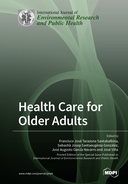Explore

Health Care for Older Adults
0 Ungluers have
Faved this Work
Login to Fave
In recent decades, life expectancy has been increasing. This is a historical milestone in the history of humanity. We have never lived so long before. In these circumstances, giving the best care to older adults efficiently is one of the greatest challenges of developed countries. This book explores different initiatives that result in the improvement of health conditions of older adults, such as multicomponent physical exercise programs, interventions that try to avoid loneliness and social isolation, and multidisciplinary assessment, and the treatment of frailty and other geriatric syndromes, of the elderly in various settings such as the Emergency Unit, Orthogeriatrics, and Oncogeriatrics. This book offers different manuscripts to readers, each trying to improve life satisfaction, quality of life, and life expectancy in older adults in different scenarios. It is up to us to achieve these goals. We are sure that these interesting chapters will contribute to improving clinical practices. Following the completion of the Special Issue "Health Care for Older Adults" for the international Journal of Environmental Research and Public Health, the Guest Editors felt the satisfaction of having reached 18 published manuscripts and the possibility of transforming this volume into a book. This book was born from the need to show how health and social advances have increased human longevity as never before. We live longer, knowing more and more the epigenetic mechanisms of this longevity, as extended aging also coexists with the least favorable aging trajectories. Among them, a syndrome stands out from the gerontological and geriatric perspective: frailty. Due to the pandemic, a social problem has increased its presence in clinical practice: ageism. Older adults have found it difficult to access the necessary clinical resources due to the simple matter of age. However, at this moment, we are able to detect and to reverse frailty. In the same way, we should aim to prevent loneliness and social isolation, involved in social frailty. Geriatric syndromes are underdiagnosed and undertreated, but clinical and geriatric knowledge provide diagnostic tools and non-pharmacological approaches to prevent and to treat them. All health professionals working together in an interdisciplinary team could improve the clinical practices to develop a quality health care for older adults, improving their life satisfaction and quality of life perception too.
This book is included in DOAB.
Why read this book? Have your say.
You must be logged in to comment.
Rights Information
Are you the author or publisher of this work? If so, you can claim it as yours by registering as an Unglue.it rights holder.Downloads
This work has been downloaded 158 times via unglue.it ebook links.
- 158 - pdf (CC BY) at Unglue.it.
Keywords
- accidental falls
- aged people
- ageing
- Aging
- anticholinergic drugs
- Beers criteria
- Body temperature
- CiteSpace
- colorectal cancer
- Comprehensive Geriatric Assessment
- COVID-19
- cutaneous temperature
- Delirium
- Dementia
- DNA Methylation
- Eichner index
- elderly
- environmental temperature
- Exercise
- feasibility
- Fracture Fixation
- Frailty
- frailty index
- functional capacity
- functional recovery
- gait recovery
- geriatric
- geriatric assessment
- geriatric liaison
- geriatric syndromes
- healthy aging
- Hip Fracture
- hip fracture surgery
- hip fractures
- Histones
- imaging
- inappropriate prescribing
- infrared thermography
- intertrochanteric fractures
- knowledge domain visualization
- life satisfaction
- Loneliness
- machine learning technique
- mapping
- masticatory function
- maximum occlusal force
- medical prescriptions for chronic pathologies
- medicine
- Medicine: General Issues
- Mental health
- Mortality
- multicomponent programs
- multidisciplinary care
- n/a
- neck stabilization exercise
- non-coding RNA
- nonspecific neck pain
- Nursing
- occupational function
- Occupational Therapy
- older adults
- orthogeriatric care
- pharmacoepidemiology
- physical activity
- Pneumonia
- posterior occlusal support
- potentially inappropriate medication
- predictive model
- Primary Health Care
- prognostic factors
- psychometrics
- Public health & preventive medicine
- Qualitative research
- random forest
- Reliability
- removable prostheses
- research hotspot
- salt pack
- skin blood flow
- social capital
- social frailty
- Social isolation
- social network
- social relationships
- standing motion
- STOPP/START
- Thai
- thermal comfort
- thermal sensation
- thermotherapy
- validity
Links
DOI: 10.3390/books978-3-0365-1824-4Editions

